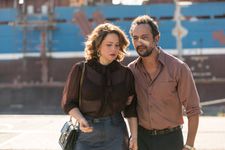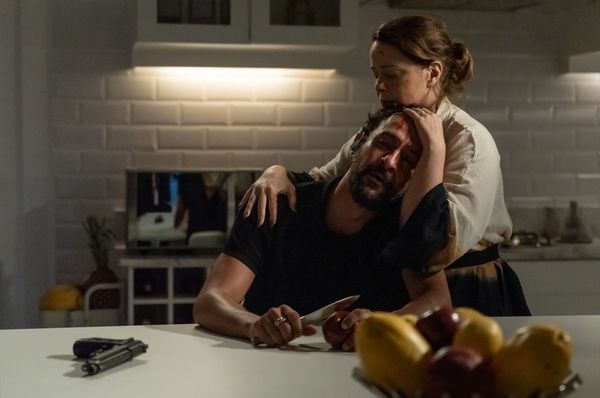I feel as though I should start by asking you if you're a big fan of Shakespeare?
Fernando Coimbra: Oh yes.
This is very Shakespearean, particularly Macbeth, but also a few other glancing blows from some other Shakespearean plays. So tell me a bit about that.
FC: The original idea came from telling the Macbeth plot but my interest was Lady Macbeth's perspective more than his perspective. The idea was like the Macbeth plot, but the way it develops is more like a Coen brothers movie. I want this tone to be more like a funny and dark comedy.
You largely dispense with the witches, unless you count the mother-in-law, maybe.
FC:Yes, that fortune teller. But you know, she's the mother, and she's actually trying to manipulate her.
 |
| Fernando Coimbra: 'We have this freedom of, let's translate the emotion through the production design' Photo: Courtesy of TIFF |
FC:Yes, the Brazilian title came from the card, but it is not in the singular, it means the plural, like the hanged men - all the characters are kind of hanged in their way, they hang themselves with their plans. So that was the title. But when we started to find an English title for it, and I worked with the title Hanged when I went to the Sundance screenwriters lab, we had this translation, but we felt that title was not strong. The word “hanged” can be anything that's hanged, not only someone who is killed in that way while in Portuguese that word is very precisely that. So, we felt it doesn’t translate.
What you chose instead is interesting because there's real carnivalesque elements. Right from the very start, there’s a kind of joker statue who she can't get rid of.
FC: That figure is called King Momo, who is the king of Carnival. So at every carnival you have a party for this figure, usually a fat man, to represent the beginning of the carnival. So as this mob in Brazil is very related to the carnival and I felt that the carnival feeling should be spread out through the whole movie, the way we tell the story. Because the origin of carnival in Babylon was a party for five days where you switch roles. So the boss will be like the servant and this family will be the boss for five days. What they used to do is they took one criminal who was sentenced to death and put this criminal in the place of the king for five days, and they could eat whatever they want, have sex with all the concubines, he just couldn't release himself from but at the end, he was beaten up and hanged. And I felt like this is kind of what happened, because they believe they are taking part of the business, because the couple doesn't really belong to their world, they don't really know how to deal with that level of criminality and all that, but they have the illusion they can deal with that. And it’s like a carnival.
There's so much strong craft work in this movie, from the costume design to the production design and I wanted to talk to you a little bit about that, maybe a bit about the production design first, because obviously this business of “out damn spot” with your the wall she keeps seeing a stain on and the striking red doors you use near the end.
FC: Since I wrote the treatment, I knew that the production design would be a star in this movie. In my first film A Wolf At The Door there was an apartment where a couple met to have sex, and because the guy was married, she was the mistress. But as the story was being told by the characters, we were changing the art and the environment a little. There were small details, and, you know, the room was getting darker, and more odd during the story. So we have this freedom of, let's translate the emotion through the production design. So in this film, I wanted to go further, and the idea of having a renovation was perfect, because we could really change the set, because at the beginning everything's like chaos, but they're aiming to make that a great place. Then when everything goes wrong, and they stop the renovation, the house becomes creepy, and very uncomfortable. Finally, when they get the money but the marriage is completely harmed, then the house is very clear and very bright. It’s the opposite of them.
 |
| Leandra Leal and Irandhir Santos in Carnival is Over. Fernando Coimbra: 'All the characters are kind of hanged in their way, they hang themselves with their plans' Photo: Helen Barreto |
Unfortunately, he died when we were preparing. He had a heart attack. It was terrible. But then I took the guy who used to work with him. I didn't change the concept, which was all done. So his sort of right hand man took the thing and we did the movie, which was a big challenge, because he never did something that big. But the whole concept was his concept. For example, the container where the guys are when they are kidnapped, I was like, “Oh, this is too much”’. And he said, “We should really go for it”. And that encouraged me to say, “Okay, this is not a naturalistic film” - and that goes back to carnival and Shakespeare. I'm really crazy about Shakespeare, and I read a lot of writers like Harold Bloom and other guys who write about his plays, and they all say that Macbeth specifically has this nightmarish feeling. It's different from the other plays and it really feels like a nightmare. It’s creepy from the beginning. It's supernatural, it's delusional, and I said, “That's the key, we should really go for it. It’s not a natural environment, there's oddness in the tone, even like framing. I was always looking for something that was somehow uncomfortable, even for me.
Did you shoot it in a specific property or did you use a set?
FC: We actually got a house. At the beginning, we were planning to use a stage, not for the whole house, but at least for the part where the renovations are going on. But it was just making it more expensive and harder for us to be able to put this in our schedule. And then we started to look for houses and we found this amazing house with that view. It's unbelievable. It's higher than any building that is there and it was exactly the mood I was looking for, in the middle of that green and the mountains, so it's kind of creepy as well. There's a lot of housing in Rio de Janeiro that the people rent for TV shows or films and you can say, “Oh, I saw this house before, somewhere else”. But the owners never did that before. So, and they were crazy, I've had to say, because they allow us to do all that, because the renovation stuff is all fake. We didn't break any walls or anything like that, this was just building fake walls - but when you step in and see that thing, you say, “Oh my God, what happened to my house.” The kitchen is the only thing that is completely built.






















